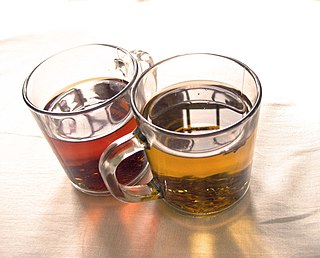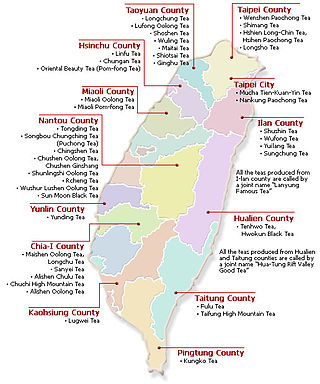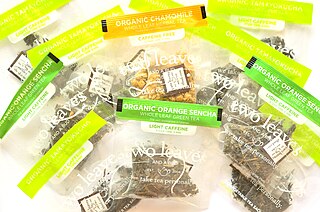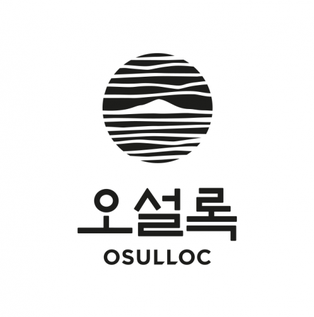
Bubble tea is a tea-based drink that originated in Taiwan in the early 1980s. Taiwanese immigrants brought it to the United States in the 1990s, initially in California through regions including Los Angeles County, but the drink has also spread to other countries where there is a large East Asian diaspora population.

Tea is an aromatic beverage prepared by pouring hot or boiling water over cured or fresh leaves of Camellia sinensis, an evergreen shrub native to East Asia which probably originated in the borderlands of southwestern China and northern Myanmar. Tea is also made, but rarely, from the leaves of Camellia taliensis. After plain water, tea is the most widely consumed drink in the world. There are many different types of tea; some have a cooling, slightly bitter, and astringent flavour, while others have profiles that include sweet, nutty, floral, or grassy notes. Tea has a stimulating effect in humans primarily due to its caffeine content.

Camellia sinensis is a species of evergreen shrub or small tree in the flowering plant family Theaceae. Its leaves and leaf buds are used to produce black and green tea. Common names include tea plant, tea shrub, and tea tree.

Nepali tea is a beverage made from the leaves of tea plants grown in Nepal. They are distinctive in appearance, aroma and taste, but are similar in many ways to tea produced in Darjeeling tea, perhaps because the eastern zones of Nepal have geography and topography similar to Darjeeling. Its relatively smaller production quantities mean that teas from Nepal are less well known than those from Darjeeling.

Darjeeling tea is a tea made from Camellia sinensis var. sinensis that is grown and processed in Darjeeling district or Kalimpong district in West Bengal, India. Since 2004, the term Darjeeling tea has been a registered geographical indication referring to products produced on certain estates within Darjeeling and Kalimpong. The tea leaves are processed as black tea, though some estates have expanded their product offerings to include leaves suitable for making green, white, and oolong teas.
Camellia sinensis, the source of tea leaves and buds, can be grown in much of the United States. Commercial cultivation has been tried at various times and locations since the 1700s, but tea has remained a niche crop and has never been cultivated widely in the US. As of 2020, the US mainland has one relatively large plantation with full mechanization in Charleston, South Carolina, and many small commercial tea gardens that pick tea by hand. Some growers feel that tea production is not economically viable without some mechanization, but there is evidence that unmechanized tea production is viable, albeit with lower net profit margins. Most domestically grown teas are available through mail order and online purchases.

Camellia oleifera, which originated in China, is notable as an important source of edible oil obtained from its seeds. It is commonly known as the oil-seed camellia or tea oil camellia, though to a lesser extent other species of camellia are used in oil production too.

Camellia sasanqua, with common name sasanqua camellia, is a species of Camellia native to China and Japan. It is usually found growing up to an altitude of 900 m (3,000 ft).

Dongfang meiren or baihao (白毫), among other Chinese names, is a heavily oxidized, non-roasted, tip-type oolong tea originating in Hsinchu County, Taiwan. It is an insect tea produced from leaves bitten by the tea jassid, an insect that feeds on the tea plant. Terpenes are released in the bitten leaves, which creates a honey-like taste. Oriental beauty, white-tip oolong, and champagne oolong are other names under which dongfang meiren is marketed in the West.

Lipton is a British-American brand of tea, owned by Lipton Teas and Infusions. Lipton was also a supermarket chain in the United Kingdom, later sold to Argyll Foods, after which the company sold only tea. The company is named after its founder, Sir Thomas Lipton, who founded it in 1890. The Lipton Ready to drink beverages are sold by "Pepsi Lipton International", a company jointly owned by Unilever and PepsiCo.

Taiwanese tea includes four main types: oolong tea, black tea, green tea and white tea. The earliest record of tea trees found in Taiwan is from 1717 in Shui Sha Lian (水沙連), present-day Yuchi and Puli, Nantou County. Some of the teas retain the island country's former name, Formosa.

The Charleston Tea Garden is located about twenty miles south of Charleston, South Carolina on Wadmalaw Island. Owned by the Bigelow Tea Company, it grows the tea sold under the brand name American Classic Tea and Charleston Tea Garden from the Camellia sinensis plant. Every year they used to host the First Flush Festival celebrating the beginning of the harvest season.

Tata Consumer Products is an Indian fast-moving consumer goods company and a part of the Tata Group. Its registered office is located in Kolkata while its corporate headquarters is in Mumbai. It is the world's second-largest manufacturer and distributor of tea and a major producer of coffee.

Tea consumption is an essential part of contemporary Australian culture, generally inherited from British tea culture though with its own distinct qualities. Small quantities of tea are grown and produced in Australia itself.
Teatulia is a privately owned tea company based in Denver, Colorado. Teatulia is named after the Tetulia region in Northern Bangladesh where the company grows and produces its teas. It is the first USDA-certified organic tea garden in Bangladesh and the first tea in the United States that is imported from Bangladesh.

Chatime is a Taiwanese global franchise teahouse chain based in Zhubei. Chatime is the largest teahouse franchise in the world. Its expansion and growth model is through franchising. It operates 2500+ outlets in 38 countries. In 2006, it opened its first store outside of Taiwan in California, United States and it has since expanded to China, Malaysia, Canada, Bangladesh, Indonesia, Philippines, Cambodia, Thailand, United Kingdom, United States, Australia, New Zealand, Maldives, India, Ireland, United Arab Emirates, Japan, Mongolia, Lebanon, Mauritius and South Korea, Switzerland among others now.

Two Leaves and a Bud manufactures and distributes organic tea. Based in Basalt, Colorado, Two Leaves and a Bud produces organic whole leaf tea that is packaged in pyramid-shaped sachets.

Sri Lanka has a climate and varied elevation that allows for the production of both Camellia sinensis var. assamica and Camellia sinensis var. sinensis, with the assamica varietal holding the majority of production. Tea production is one of the main sources of foreign exchange for Sri Lanka, and accounts for 2% of GDP, contributing over US$1.3 billion in 2021 to the economy of Sri Lanka. It employs, directly or indirectly, over 1 million people, and in 1995 directly employed 215,338 on tea plantations and estates. In addition, tea planting by smallholders is the source of employment for thousands whilst it is also the main form of livelihood for tens of thousands of families. Sri Lanka is the world's fourth-largest producer of tea. In 1995, it was the world's leading exporter of tea, with 23% of the total world export, and Sri Lanka ranked second on tea export earnings in 2020 after China. The highest production of 340 million kg was recorded in 2013, while the production in 2014 was slightly reduced to 338 million kg. India has additionally guaranteed Sri Lanka a shipment of 65,000 metric tons of urea. Sri Lanka's troubled execution of an organic agriculture initiative had pushed the country perilously close to an agricultural crisis. Given the surge in global fertilizer prices, it is improbable that Sri Lanka could procure fertilizer at prevailing market rates.

Sikkim tea is a variety of tea grown in the state of Sikkim, India. Though Sikkim tea is not as widespread in use as the neighboring Darjeeling tea, it has recently gained more recognition from the increasing demand for organic products. The tea is mostly sold under the marketing name 'Temi tea'. After Darjeeling tea became the first Indian product to receive a GI tag, Sikkim's Temi tea has been waiting to receive the same.

O'Sulloc Tea is a traditional Korean tea manufactured and sold by the South Korean company O'Sulloc. The company was founded in 1979 by Suh Sung-hwan. O'Sulloc Corporation was established in September 2020 as an independent subsidiary of the Amorepacific Corporation, with 100% ownership. O'Sulloc Tea originates from the cultivated fields on Jeju Island. It is also an internationally recognized brand in other countries such as China, Japan, and the United States. O'Sulloc teas consist of a range of black and green teas based on traditional Korean tea culture. O'Sulloc teas have various certifications, and in 2010 were certified with the National Organic Program (NOP) certification by the United States Department of Agriculture (USDA).


















